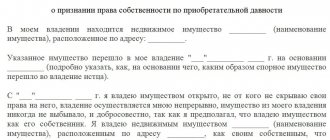Grounds for registering property through court
There are the following grounds that allow you to obtain a positive court decision:
- Another person is claiming the property. At the same time, the right of the owner is not recognized by him or is constantly challenged.
- Ownership is disputed by a person who wants joint ownership.
- Recognition of rights is necessary if supporting documents are lost.
- Disputes regarding the completion of a purchase and sale transaction.
If a purchase and sale transaction has taken place and ownership has been registered, the house becomes the property of the new owner. The old owner no longer has the opportunity to claim the property if the documents were drawn up correctly from a legal point of view.
If one of the relatives of the previous title holder has invested heavily in purchasing or improving the quality of the house, he can go to court to obtain money. In this case, he must file a claim not against the buyer, but against the seller of the house.
How to recognize the right to a house?
First of all, you need to go to court with a well-drafted claim and applications. It must clearly and consistently reflect the situation as the plaintiff sees it. At the end of the statement, demands for recognition of ownership are made. The claim must be accompanied by documents that confirm the correctness of the position.
The claim is sent to the district court to which the house belongs. To determine the exact address, you can contact the court reception or look at the address in the jurisdiction section on the court’s website. The application can be submitted directly to the judge or through the office.
Important! The entire package of documents must be submitted in at least 3 copies. A copy is prepared for the plaintiff, the defendant and the court. If there are several defendants, it is necessary to prepare a set of documents for each of them.
When filing a claim, your copy will be stamped with an entry number and a signature on the receipt. Next, the court sets a date for the first hearing (conversation). You can find it on the court’s website or call the judge’s office or reception office. Notification is sent to all participants, but it does not always arrive on time.
Going to court
You should contact the judicial authorities if you have exhausted all possibilities to resolve the problem pre-trial.
Note! If rights have been infringed, special attention must be paid to preparing documents and filing a claim. You must have documents confirming your ownership of the house and land. If possible, enlist the support of citizens who agree to act as witnesses at the trial.
According to the current legislation, cases of recognition of property rights fall into the category of civil proceedings. They are heard in district courts depending on the location of the house. According to Art. 12 of the Civil Code of the Russian Federation, every citizen can count on recognition of a right if it is violated or disputed by third parties.
There are the following opportunities to assert your rights in court:
| District Court | Most owners who have always been owners, but cannot register the property due to lack of documents, come here. They also turn here if a dispute arises with other applicants for the house. |
| Arbitration court | Here they consider issues of failure by officials to fulfill their obligations if they interfere with obtaining ownership of a house. |
In addition to the possibility of appealing to the district court, you can file a claim to appeal the decision of the official in the arbitration court. This option applies if we are talking about violations by employees carrying out property registration or other actions aimed at recognizing the ownership rights of a specific person.
House without documents
There are several options for events in which the actual owner does not have a document of ownership of the house, namely:
- in case of actual inheritance without issuing a certificate of receipt of inheritance;
- in case of actual receipt of a house as a gift without execution of a deed of gift and its subsequent registration;
- in case of unauthorized construction.
It would seem that for all of the above cases there is the same basis for going to court - the lack of documents on ownership.
In fact, each of these cases has its own peculiarity, namely the method of obtaining actual possession of the house.
Accordingly, the grounds for going to court change, although recognition of property rights will still take place, albeit for different reasons.
Collection of evidence
The judge cannot objectively consider your claims until he receives a complete evidence base that reflects the picture of what happened. If documents are missing, it is important to prove that you could not obtain or restore them earlier. If illegal actions are taken by officials, the application is submitted to the arbitration court. This must be done within 3 months after the violation is detected. If the deadline is missed, the court can restore it. But this requires compelling reasons and a separate petition.
After recognition of ownership in court, you can register ownership and receive the corresponding extract from the Unified State Register of Real Estate. To do this, you need to wait until the court decision comes into force and the writ of execution is ready.
Where to contact
Consideration of claims for recognition of property rights is within the jurisdiction of courts of general jurisdiction, that is, district or city.
Ideally, it is also possible for claims to be considered by magistrates, but on the condition that the price of the claim (that is, the cost of the house) does not exceed 50,000 rubles. Since it is difficult to imagine a house with such a price, you shouldn’t even think about global jurisdiction.
The jurisdiction of claims for recognition of property rights is determined by the location of the house to which the right is recognized.
Filing a claim
It is important to file the claim on a blank A4 sheet. It is advisable to submit it in printed form. But you can also write it by hand in legible handwriting. An application may be refused only due to poor handwriting.
The claim must have the following content:
| Introductory part | It is written in the upper right part of the sheet. The name of the court, passport details of the plaintiff, passport details or name of the defendant’s organization are indicated. |
| Main part | After the heading “Statement of Claim for Recognition of Ownership of a House,” the essence of the problem and the actions taken to solve it are described in detail but concisely. The following is a request to the court to make specific decisions on restoration of rights. |
| Final part | At the end there is a list of attachments - copies of documents confirming your case. Next, the date of filing the claim and the signature of the plaintiff are indicated. |
It is important to file not only a claim, but also documents that can confirm the right of your claim.
The following documents may be needed by the judge:
- Legal documents on the basis of which housing was purchased (sale and purchase agreement, gift, exchange, inheritance certificate, privatization document).
- Technical certificate.
- Invoices, statements and deeds that show payment of bills for a house with your name on it.
- Tax payment receipt.
- The act of acceptance and transfer.
- Receipt for payment of state duty.
Procedure
To file a claim for recognition of ownership of a property, it is necessary to determine the appropriate judicial authority. The procedure for applying depends on the legal status of the applicant:
- a legal entity or individual entrepreneur submits documents to the arbitration court;
- an individual sends an application to the district or city court at the location of the property;
- if the cost of the object is less than 100,000 rubles, then the individual sends the documents to the magistrate’s court.
Procedure for protecting the rights of the actual owner of property in court:
- Collection of documentation and preparation of a statement of claim.
- Payment of duty.
- Participation in a court hearing.
- Receiving a decision and its execution.
Documents required for court
To prepare a statement of claim, you must collect the following documents:
- civil passport of the applicant - an individual;
- statutory documents of the applicant – legal entity;
- civil passport and power of attorney of a representative of a legal entity;
- civil passport and USRE of the applicant – individual entrepreneur;
- fee payment receipt;
- peer review report;
- information confirming ownership of the disputed object;
- receipts for payment of utilities and a certificate of absence of debt;
- technical and cadastral documentation;
- information on privatization (if available);
- other information as required by the court.
Information is provided in the form of copies certified by the applicant’s signature. Original documents are presented directly on the day of the court hearing.
The plaintiff must provide evidence based on which the court can recognize him as the owner of the property. In addition to documentary evidence, witnesses can be involved. For example, in the case of actual acceptance of an inheritance.
When preparing a statement of claim, it is advisable to involve a lawyer. A specialist can represent the interests of the actual owner in court. The costs of a lawyer will be justified by satisfying the plaintiff's demands. The law prohibits repeated recourse to court on such an issue, so the support of a specialist is necessary to achieve the goal.
The procedure for recognizing ownership of a house in court
After filing a claim with a package of documents, about 10 days pass before the first meeting is scheduled. On it, the judge will find out whether there are any petitions or the need to request additional documents through the court. As a rule, the first meeting does not last long. If the issue is not complex, the decision is made in 2-3 meetings.
If the plaintiff has sufficient grounds, the judge usually takes his side. In most cases this applies to buyers. As a result of the investigation, a ready-made decision is issued, with which you need to come to the BTI. A cadastral passport with an explanation will be prepared here. Then you need to contact Rosreestr to register the ownership of the house. The court decision is submitted with the remaining documents.
Remember! The defendant has the opportunity to appeal the decision within 30 days. The complaint can be filed with the regional and then the Supreme Court. As a rule, the appeal remains without consideration. But it is important to keep track of these points in order to prepare for the meeting in a timely manner.
One of the most frequent and complex cases of contestation is disputes in the order of inheritance. As a rule, they arise when a house is transferred by will to only one heir, and the interests of other persons are not taken into account. In this case, the judge takes into account whether the testator had dependents. They can be young children. Adult children, parents or spouses who are unable to work for health reasons are also recognized as dependents. An outsider can also act as a dependent. The main condition is official status, living with the testator for the last year.
If such persons are found, they are allocated a share in the received property. If they are not, the judge usually sides with the heir who received the house.
Grounds for filing a claim for recognition of ownership of a residential building
There are a number of reasons for filing a claim for recognition of ownership of a residential building:
- documents for real estate do not meet legal standards - after the purchase the contract was not registered in Rosreestr, and was not confirmed by the BTI department;
- the owner of the house has died, there are no first-line heirs, and it is not possible to find other legal successors;
- there is no complete package of documents for the house, but the plaintiff has owned it for more than 15 years;
- there is an extract from the house register, but the owner does not have title documents for the property;
- in case of unauthorized construction requiring legalization. It occurs when documents for land, construction, an allocated share in a shared participation, or a cooperative are not fully completed;
- to include property that the deceased did not have time to register in the inheritance mass;
- when papers are lost;
- the house is claimed by persons who do not have the right to it;
- the right of ownership of the property is not recognized by the co-owner;
- in case of conflict with a shareholder.
Sample statement of claim
Claim proceedings are regulated by the Civil Law Code of the Russian Federation . Errors in the preparation of a document can lead to its invalidity.
The statement of claim for recognition of ownership of a residential building contains:
- the name of the court that will consider it;
- Full name of the direct applicant, his passport details;
- price of the claim (statement of claim);
- location of the disputed object, its total area, building plan, other technical characteristics;
- on the basis of which document the house was purchased;
- the reason for going to court - who and for what reasons does not recognize the plaintiff’s property rights;
- data on the presence/absence of various types of encumbrances - loan, lease, donation, etc.;
- legislative argumentation of one’s position on the basis of articles of the Code of Civil Procedure of the Russian Federation. This requirement is met by Articles 217, 131-132;
- recognition of property rights with compensation for material and moral damage is required;
- list of additional papers;
- Date of preparation.
The initiator of a case resolution in court can be either one party or both at the same time. Which court to contact depends on the cost of the claim. Smaller claims can be resolved with the help of a magistrate. Significant amounts of claims are accepted by the district court. A properly executed statement of claim must contain a succinctly described reason for the application, the most extensive data on the object and a list of necessary papers.
a claim for recognition of ownership of a residential building can be found here.
List of documents
A list of confirmations is attached to the court application. Documents attached to the claim for recognition of ownership of a residential building serve as a certifying basis for considering the case and making a decision on it.
Such documents include the plaintiff’s passport, technical documentation for the property. The evidence base consists of documents of title to the house - a purchase and sale agreement, a gift agreement, an inheritance agreement, a court order. Evidence may also include an excerpt from the house register, testimony of witnesses confirming that one of the parties to the transaction has lived in this house for more than 15 years. Confirmation that you lived in this house can be receipts for its repairs, payment of utilities, etc. To certify the purchase and sale of a house, you must provide an extract from the notary book, a check, a receipt for money or other related facts. A duplicate of the technical passport from the BTI must be attached. The court begins to consider the case only if there is a receipt for payment of the state fee.
You must take the originals of all submitted documents with you to the court hearing. Their personal confirmation may be required during the meeting. If additional evidence is found before the trial, but it was not attached to the claim, it can be presented in the courtroom.
State duty amount
The amount of state duty is established by the provisions of the tax legislation of the Russian Federation ( Article 333 ). The amount of the state fee depends on two factors: the size of the claim and whether or not an assessment of the property in question is required.
Recognition of ownership of a residential building when assessing a claim and its total price:
- up to 20 thousand rubles is 4% of the claim price, but must be less than 400 rubles;
- from 20 thousand 01 rub. up to 100 thousand - 800 rubles, 3% of the amount exceeding 20 thousand;
- from 100 thousand 01 rub. up to 200 thousand – 3 thousand 200 rubles, 2% of the amount exceeding 100 thousand;
- from 200 thousand 01 rub. up to 1 million rubles – 5 thousand 200 rubles, 1% of the amount exceeding 200 thousand rubles;
- over 1 million rubles – 13 thousand 200, 0.5% of the amount exceeding 1 million rubles, but not more than 60 thousand rubles.
When filing an application for a court order, a state fee of 50% of the above amounts is paid. If the submitted application does not require assessment, the state duty is 300 rubles for individuals and 6,000 rubles for organizations.
Statute of limitations
To establish the right of ownership of a residential building, the general rules of limitation apply - 3 years, from the moment when the person should have known or learned about the violation of his own rights. However, the court does not have the right to refuse the applicant’s request solely on the basis of the expiration of the relevant statute of limitations.
Common mistakes
When filing a claim for recognition of rights to real estate, it is important to remember that this is only a confirmation of your rights.
For this reason, recognition of ownership without the application of preliminary requirements is possible if the following conditions are met:
- There is a dispute about the rights to the house.
- Availability of a ready-made property.
- Absence of obligations between the parties, the subject of which is the house.
As for the latter case, the statement loses its meaning, since the claim goes into the plane of demands for the fulfillment of obligations. Once the property right is recognized, it becomes irrelevant, and the judge has the right to refuse consideration.
As a result, if there are sufficient grounds, the court often sides with the plaintiff. But at the same time, it is important to competently draw up a claim and pay serious attention to the preparation of application documents.
The video will tell you how property rights are recognized in court
Undecorated gift
Another way to remain without ownership documents is to accept the house as a so-called “oral gift”.
As a rule, options for an “oral gift” can be:
- a relative’s offer to move into an empty house, usually in a village;
- accepting obligations to care for an elderly person without drawing up a rental agreement. In this case, a certain citizen provides care, lives with the elderly person and buries him at his own expense.
In both cases, the person accepts the house for actual use and with the desire to subsequently formalize a donation agreement. But since all people are mortal, it is not always possible to conclude an agreement. And the person remains in the house that actually belongs to him, and at the same time without any documents confirming his rights.
After the death of the actual donor, it is useless to go to the notary, since he will no longer be able to help. The only way out of the situation is to go to court with a claim for recognition of ownership rights.
In court it will be necessary to prove that:
- the fact of donation actually took place, but the agreement was not executed;
- during the life of the donor, the plaintiff constantly lived in the house, paid utilities, taxes and insurance;
- the plaintiff maintained order in the house, carried out repairs and improvements;
- the plaintiff buried the donor if the house was an oral gift in exchange for care for the elderly;
- the plaintiff takes care of the donor’s grave, etc.
The following can be used as evidence:
- certificates of funeral expenses;
- receipts for payment of utilities after the death of the donor;
- receipts for the purchase of building materials;
- witness's testimonies.
As can be seen from the above, ownership in this scenario is established by filing a lawsuit in court for recognition of ownership. The differentiation is carried out according to the method of receiving the house, due to which it will be necessary to prove not only the fact of residence in the house, but also the fact of the donor’s will to donate this house to the plaintiff.








